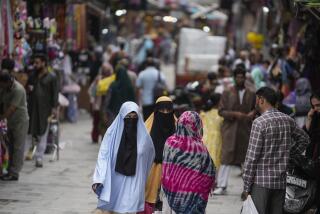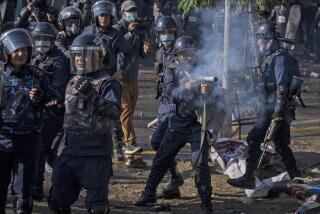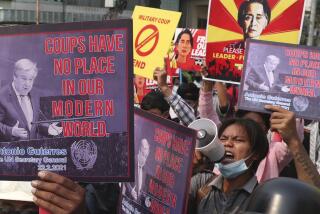Nepal’s Parliament Calls Elections
- Share via
KATMANDU, Nepal — The Nepalese parliament voted Sunday to call elections for an assembly to redraw the country’s constitution, an action that could signal the beginning of the end for the monarchy that has ruled this Himalayan kingdom for more than 200 years.
During the same session, the newly sworn-in prime minister, Girija Prasad Koirala, also asked Nepal’s Maoist rebels, who have waged a bloody decade-long insurgency in the countryside, to come to the bargaining table.
“I urge the Maoists to renounce violence and to come for dialogue,” Koirala said to widespread approval from members of the House.
By tackling the issues of a constitutional assembly and the Maoist rebellion as its first orders of business, the parliament clearly showed its intention to address problems that brought it back into power nearly four years after King Gyanendra dissolved the body. For nearly three weeks in April, thousands of protesters every day brought Katmandu, the capital, to a standstill to demand that democracy be restored and the process of revamping the constitution initiated.
More than a dozen demonstrators were killed by police as the protests continued in spite of curfews as Gyanendra refused to give up absolute rule. But last week, the king capitulated, agreeing to reconvene parliament, which reopened Friday.
Setting up a constitutional assembly was a key demand by both the Maoists, who agreed to support the peaceful pro-democracy movement on the streets, and by many of the protesters, who became increasingly vociferous about ousting the king and establishing a full-fledged republic. The parliament Sunday unanimously approved calling elections for a constitutional assembly, but did not outline a timetable for the process.
A key consideration will be the role of the insurgents in the assembly elections and the difficulty of conducting a free and fair vote if the rebels remain under arms and on the offensive. A small reprieve surfaced last week when the rebels announced a three-month cease-fire, but any redrafting of the constitution would take much longer than that.
The communist insurgency has cost about 13,000 lives over the last 10 years; it was to suppress the Maoists that Gyanendra justified his sacking of the government in February 2005, saying he needed unfettered power to mount a crackdown.
The goal of the opposition political alliance that resumed its seats in parliament is instead to coax the rebels to negotiate and work within the system. In an agreement struck between the alliance and the Maoists last fall, the rebels agreed to abide by democratic rules if a constitutional assembly was called.
The challenge will be to hold them to their word. Many here distrust the insurgents; indeed, hours after the cease-fire was announced, rebels abducted 11 soldiers in eastern Nepal, later releasing eight of them.
Koirala, the new prime minister, was sworn in Sunday morning at the royal palace, taking the oath of office before Gyanendra, the man whose autocratic rule he sought to end as a senior leader of the opposition alliance.
Koirala, in his early 80s and in his fifth stint as Nepal’s premier, is in ailing health. The king asked after Koirala’s health at the swearing-in ceremony, and the premier’s doctor was present in parliament with him.
*
Times staff writer Chu reported from New Delhi and special correspondent Rauniar from Katmandu.
More to Read
Sign up for Essential California
The most important California stories and recommendations in your inbox every morning.
You may occasionally receive promotional content from the Los Angeles Times.














